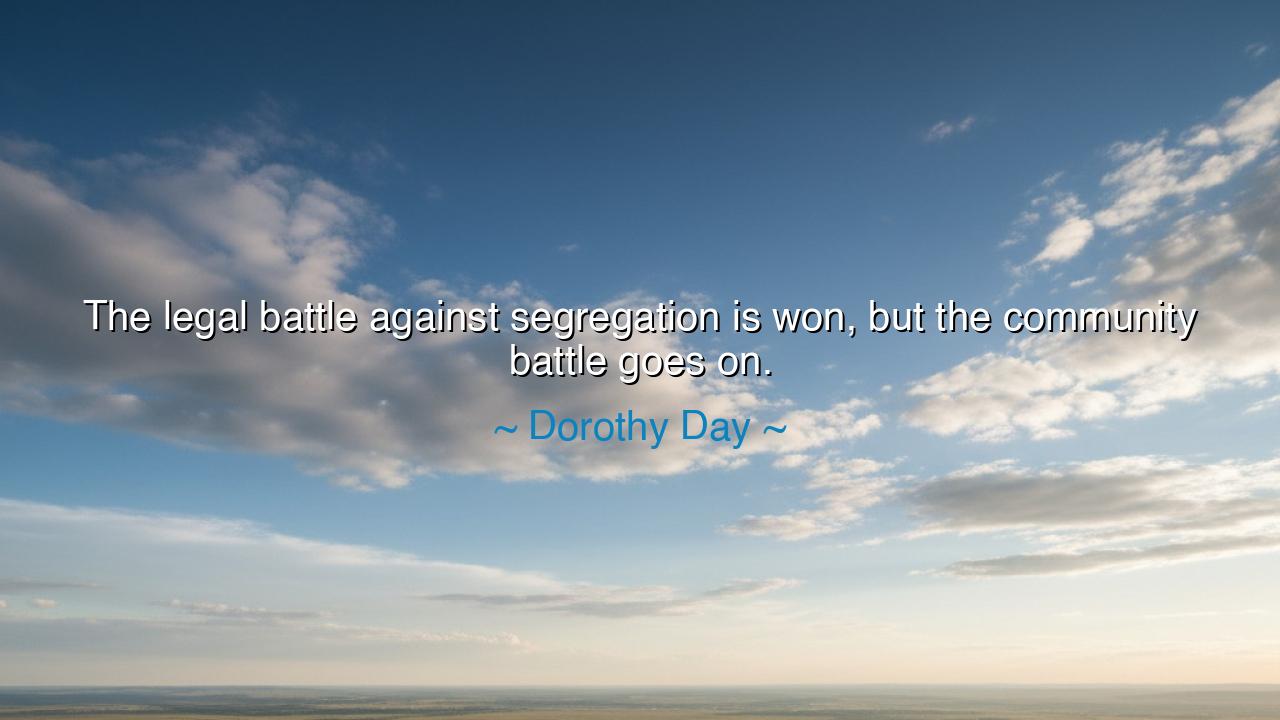
The legal battle against segregation is won, but the community






Hear, O seekers of truth and pilgrims of justice, the words of Dorothy Day: “The legal battle against segregation is won, but the community battle goes on.” These words cut like a blade of wisdom through the illusions of easy victory. For law may decree equality, but hearts and habits are not changed by parchment alone. The edicts of courts can strike down the chains of statute, yet the subtler chains—woven of fear, prejudice, and pride—still bind men and women in their daily lives.
The ancients knew this divide between law and spirit. In Athens, Solon the lawgiver proclaimed reforms that gave freedom to the poor and balance to the city. Yet even he declared that while laws could be written, the souls of men were harder to reform. So too in our own age: segregation was overthrown in the courts, most famously in Brown v. Board of Education, when the Supreme Court declared that separate schools for Black and white children were inherently unequal. The legal battle, waged with courage and sacrifice, achieved victory. But the struggle within towns, neighborhoods, and hearts—that battle lingers still.
Consider the story of Little Rock in 1957, when nine Black students entered Central High School under the guard of federal troops. The law had spoken, yet mobs still gathered, jeering and spitting, their hatred unbroken by the gavel. Those brave students walked not merely into classrooms but into the fire of the community battle. For while the courts had opened the doors, the hearts of neighbors had yet to accept them as equals. It is in such stories that Dorothy Day’s words find their flesh and bone.
The origin of her saying lies in her life as a Catholic activist, one who dedicated herself to the poor, the oppressed, and the marginalized. Day saw that justice was not achieved merely by the machinery of law but by the transformation of how people lived with one another. She understood that even after legal battles were won, the true test lay in whether communities could embrace reconciliation, compassion, and brotherhood. The work of justice, to her, was always a labor of love lived daily among the people.
The meaning of this teaching is clear: laws can forbid injustice, but they cannot create love. A society may legislate equality, but only the practice of kindness, solidarity, and respect can bring peace. The community battle is therefore greater than the legal one, for it demands not lawyers and judges, but ordinary men and women willing to look upon their neighbors without prejudice, willing to build bridges where once there were walls.
The lesson for future generations is this: never think the struggle ends with a court ruling or a law passed. The ink on paper is only the beginning; the true work is written on the human heart. It is in schools, workplaces, churches, and homes that the seeds of justice must be sown, watered, and guarded. Victory is not secured until equality is lived, not just declared.
Practical action lies before us: engage your community with openness; do not retreat into silence when injustice lingers in custom or attitude. Teach children to honor dignity in all, not only as a legal right but as a moral truth. Support local efforts of reconciliation, dialogue, and shared service that break down barriers of division. Remember that you are not only a citizen under law but also a neighbor within community, and it is in the latter role that justice either thrives or dies.
So let it be remembered: the legal battle is a great and noble step, but the community battle is the longer pilgrimage. Walk it with patience, with courage, and with love, and you will leave behind not only laws of justice, but a society where justice is lived as the natural breath of daily life.






AAdministratorAdministrator
Welcome, honored guests. Please leave a comment, we will respond soon